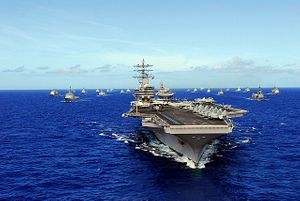On April 6, US Secretary of Defense Ash Carter delivered a speech at the McCain Institute at Arizona State University on ‘the next phase’ of the US rebalance to the Asia-Pacific.
The speech began with a customary nod to the Asia-Pacific’s growing importance, a brief assessment of America’s strengths in the region, and an overview of the rebalance.
Carter then went on say what ‘the next phase’ of the US rebalance might entail on the defense side, focusing on four components: investments; capabilities; posture; and partnerships and alliances. He touched on investments in a new long-range stealth bomber and a new, long-range anti-ship cruise missile; the fielding of key US capabilities like advanced fighters and missile-defense equipped ships; adapting America’s bases, personnel and platforms to be more distributed, resilient and sustainable; and reinforcing existing alliances, emerging partnerships, and links between them, including trilateral cooperation with Japan and Australia.
But after this deep dive into defense issues, Carter also spent some time in his speech to highlight the importance of concluding the Trans-Pacific Partnership (TPP). He stressed its importance in boosting US exports, strengthening key US relationships in the Asia-Pacific, signaling America’s commitment to the region more broadly, and promoting U.S. values. He even likened the TPP to be as important to him as another aircraft carrier.
“In fact, you may not expect to hear this from a Secretary of Defense, but in terms of our rebalance in the broadest sense, passing TPP is as important to me as another aircraft carrier,” Carter said.
“It would deepen our alliances and partnerships abroad and underscore our lasting commitment to the Asia-Pacific,” he continued. “And it would help us promote a global order that reflects both our interests and our values”.
He also said that time was running out as countries in the region are already pursuing alternatives and the United States risks being on the sidelines.
“Time’s running out: we already see countries in the region trying to carve up these markets forging many separate trade agreements in recent years, some based on pressure and special arrangements rather than openness and principle. Agreements that don’t incorporate our high standards and leave us on the sidelines. That risks America’s access to these growing markets, and it risks regional instability. We must all decide if we are going to let that happen,” Carter said.
Of course, Carter joins a long list of US officials, former officials, and experts who have been calling for a quick conclusion to the TPP. Last month, Kurt Campbell, who was America’s top diplomat in the Asia-Pacific under the Obama administration until 2013, attempted to emphasize the TPP’s importance by noting how it would factor into Asia’s grading of America’s policy in the region at a keynote address to the Jamestown Foundation’s Fifth Annual Defense and Security Conference.
“If we did everything right in Asia…and not get TPP, we can’t get a passing grade. We can do everything wrong…and get TPP, and we get a B,” Campbell said.
Yet Carter’s comments are still to be welcomed in this regard. They are also additionally important because they are coming from a U.S. defense official, and one of the criticisms leveled at U.S. Asia policy – fairly or unfairly – is that it has at times seemed too security-focused.

































